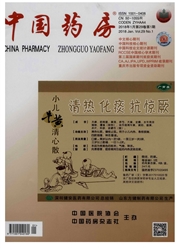

 中文摘要:
中文摘要:
目的:了解国家基本药物制度背景下居民对抗茵药物的认知与使用现状,为促进居民合理使用抗菌药物提供参考。方法:采用多阶段分层随机抽样方法,在山东省按照经济发展水平好、中、差选取5个市的居民进行问卷调查,运用定量与定性相结合的方法分析居民抗茵药物的认知与使用情况。结果:共发放问卷1700份,回收问卷1640份,回收率为96.47%,其中有效问卷1518份,有效率为92.56%。调查结果显示,59.7%的被调查者不了解抗菌药物,57.5%的被调查者不了解抗茵药物滥用所产生的危害;44.5%的被调查者习惯使用抗菌药物治疗感冒,36.0%的被调查者家中常备抗菌药物;被调查者对抗茵药物的认知与使用密切相关(P〈0.05);被调查者购买抗菌药物的主要途径为医院处方。结论:国家基本药物制度背景下居民对抗菌药物的认知水平有待提高,对抗菌药物的使用现状亟需改善。建议加强抗茵药物知识宣传,提高居民抗菌药物认知水平;医务人员应发挥优势,对居民进行及时教育和指导;国家应加强抗菌药物销售的监管,规范抗菌药物的销售途径。
 英文摘要:
英文摘要:
OBJECTIVE: To investigate the cognition of residents about antibacterials and the use of them under National Essential Medicine System, and to provide reference for the rational use of antibacterials. METHODS : Multistage stratified sampling was used to select respondents. The residents were selected from 5 cities in Shandong province for a questionnaire survey according to economic development level. By using the methods of quantitative and qualitative analysis, this study analyzed the cognition of residents and use of antibacterials. RESULTS: 1 700 questionnaires were sent out, and 1 640 were returned with return rate of 96.47%. Among 1 640 questionnaires, 1518 questionnaires were valid with valid rate of 92.56%. 59.7% of residents expressed that they did not familiar with antibacterials, and 57.5 % didn't have an understanding that abuse of antibacterials could lead to undesirable effects. 44.5% of residents accustomed to using antibacterials in the treatment of common cold. 36.0% of residents had antibacterial drugs ready at home. There was close relationship between cognition and use of antibacterials(P〈0.05). The main way to gain the antibacterials was doctors' prescriptions. CONCLUSIONS: The residents still need to improve the knowledge and use of antibacterials under National Essential Medicine System. It is suggested to enhance propaganda education and improve cognitive level. The medical staff should develop their superiority and give the guidance and education to residents. The government should strengthen the management of antibacterials sales to promote the rational use of antibacterials.
 同期刊论文项目
同期刊论文项目
 同项目期刊论文
同项目期刊论文
 期刊信息
期刊信息
